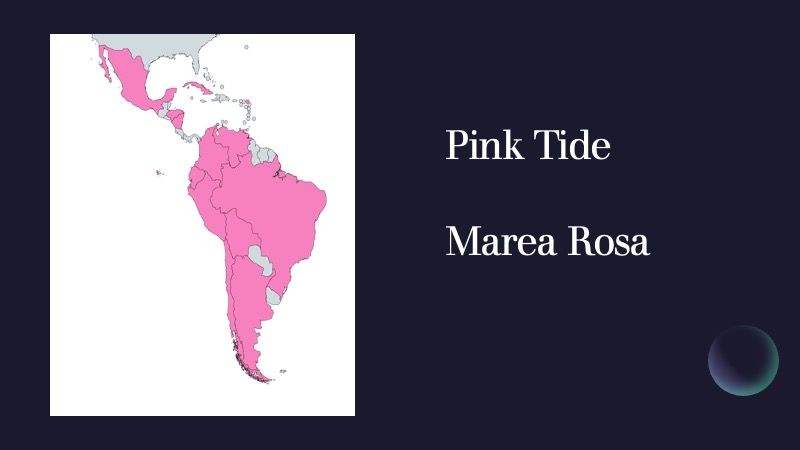History seems to show some partial benefit to Latin America in moments when the United States was otherwise distracted, as by its Civil War and other wars. This is a moment right now in which the U.S. government is at least somewhat distracted by Ukraine and willing to purchase Venezuelan oil if it believes that contributes to hurting Russia. And it is a moment of tremendous accomplishment and aspiration in Latin America.
Latin American elections have increasingly gone against subservience to U.S. power. Following Hugo Chavez’s “Bolivarian revolution,” Néstor Carlos Kirchner was elected in Argentina in 2003, and Luiz Inácio Lula da Silva in Brazil in 2003. Independence-minded President of Bolivia Evo Morales took power in January 2006. Independence-minded President of Ecuador Rafael Correa came into power in January 2007. Correa announced that if the United States wished to keep a military base any longer in Ecuador, then Ecuador would have to be permitted to maintain its own base in Miami, Florida. In Nicaragua, Sandinista leader Daniel Ortega, ousted in 1990, has been back in power from 2007 to today, though clearly his policies have changed and his abuses of power are not all fabrications of the U.S. media. Andrés Manuel López Obrador (AMLO) was elected in Mexico in 2018. After set-backs, including a coup in Bolivia in 2019 (with U.S. and UK support) and a trumped-up prosecution in Brazil, 2022 saw the list of “pink tide” governments enlarged to include Venezuela, Bolivia, Ecuador, Nicaragua, Brazil, Argentina, Mexico, Peru, Chile, Colombia, and Honduras — and, of course, Cuba. For Colombia, 2022 saw its first election of a left-leaning president ever. For Honduras, 2021 saw the election as president of the former first lady Xiomara Castro de Zelaya who had been ousted by the 2009 coup against her husband and now first gentleman Manuel Zelaya.
Of course, these countries are full of differences, as are their governments and presidents. Of course those governments and presidents are deeply flawed, as are all governments on Earth whether or not U.S. media outlets exaggerate or lie about their flaws. Nonetheless, Latin American elections (and resistance to coup attempts) suggest a trend in the direction of Latin America ending the Monroe Doctrine, whether the United States likes it or not.
In 2013 Gallup conducted polls in Argentina, Mexico, Brazil, and Peru, and in each case found the United States the top answer to “What country is the greatest threat to peace in the world?” In 2017, Pew conducted polls in Mexico, Chile, Argentina, Brazil, Venezuela, Colombia, and Peru, and found between 56% and 85% believing the United States to be a threat to their country. If the Monroe Doctrine is either gone or benevolent, why haven’t any of the people impacted by it heard about that?
In 2022, at the Summit of the Americas hosted by the United States, only 23 of 35 nations sent representatives. The United States had excluded three nations, while several others boycotted, including Mexico, Bolivia, Honduras, Guatemala, El Salvador, and Antigua and Barbuda.
Of course, the U.S. government always claims it is excluding or punishing or seeking to overthrow nations because they are dictatorships, not because they are defying U.S. interests. But, as I documented in my 2020 book 20 Dictators Currently Supported by the United States, of the world’s 50 most oppressive governments at that time, by the U.S. government’s own understanding, the United States militarily supported 48 of them, allowing (or even funding) weapons sales to 41 of them, providing military training to 44 of them, and providing funding to the militaries of 33 of them.
Latin America never needed U.S. military bases, and they should all be shut down right now. Latin America would always have been better off without U.S. militarism (or anyone else’s militarism) and should be liberated from the disease immediately. No more weapons sales. No more weapons gifts. No more military training or funding. No more U.S. militarized training of Latin American police or prison guards. No more exporting south the disastrous project of mass incarceration. (A bill in Congress like the Berta Caceres Act that would cut off U.S. funding for military and police in Honduras as long as the latter are engaged in human rights abuses should be expanded to all of Latin America and the rest of the world, and made permanent without conditions; aid should take the form of financial relief, not armed troops.) No more war on drugs, abroad or at home. No more use of a war on drugs on behalf of militarism. No more ignoring the poor quality of life or the poor quality of healthcare that create and sustain drug abuse. No more environmentally and humanly destructive trade agreements. No more celebration of economic “growth” for its own sake. No more competition with China or anyone else, commercial or martial. No more debt. (Cancel it!) No more aid with strings attached. No more collective punishment through sanctions. No more border walls or senseless impediments to free movement. No more second-class citizenship. No more diversion of resources away from environmental and human crises into updated versions of the archaic practice of conquest. Latin America never needed U.S. colonialism. Puerto Rico, and all U.S. territories, should be permitted to choose independence or statehood, and along with either choice, reparations.






